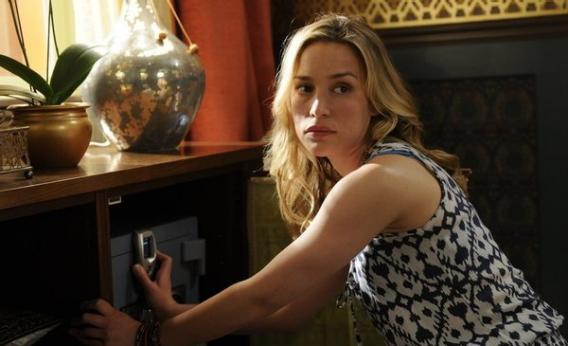In the pilot episode of Covert Affairs, which concludes its third season tonight, Annie Walker (Piper Perabo) was plucked out of the CIA’s training program even before she graduated and planted in the middle of a very important mission. A world traveler who decided to make more productive use of her prodigious language skills after her boyfriend disappeared from their Sri Lankan beachfront love nest, Annie was an unlikely operative. Although she was naturally gifted at the practical side of spycraft, and so perceptive she could get a side gig as a clairvoyant, she always seemed a little too innocent and trusting for the spy game. That premature elevation from trainee to full-fledged agent also left her permanently off-balance, unsure why she’d been singled out (she later discovered she was being used as bait for her ex-agent ex-boyfriend) and not quite convinced that she was ready for the job.
Season 1 of the USA Network drama, which aired in 2010, focused on Annie’s attempt to become comfortable with the deception that is so central to recruiting and running assets. She was a fast learner who rapidly matured into the Domestic Protection Division’s most valuable agent, but she was lonely, still heartbroken about her lost love and isolated by the cover story that left her friends and family outside the agency believing she worked at the Smithsonian. After each heart-racing foreign mission, she had to pretend to her sister and landlord Danielle that the most exciting part of her job was acquiring artwork for the museum.
In Season 2, Annie told her sister how she really spent her days, and Danielle had a hard time handling the truth. The show, which—unusually for a basic cable series—somehow has the budget to film in glamorous foreign locations, made Annie’s work seem like rollicking, dangerous, incredibly exciting fun, while her home life was even more of a bummer than before. After two years with the agency, Annie knew she could do the job, but she was unsure if she should do the job.
In the third season, which reaches its climax tonight, Annie has seemed utterly miserable in every phase of her life. Her work at the CIA is one long string of death, double-crosses, and danger, and when Danielle moved across the country to save her marriage, Annie was left all alone in D.C. Even worse, this year’s heartbreak was almost literal when she was shot in the chest by a rogue agent. The peculiar thing is, the unhappier Annie becomes, the stronger the show gets.
Covert Affairs once relied far too heavily on goofy party tricks, including Annie Walker’s ludicrous language skills. (It’s one thing to speak seven languages fluently, but in addition to Italian, Russian, Spanish, German, French, Farsi, and Portuguese, she often breaks out advanced Hebrew, Estonian, Mandarin, Sinhalese, Basque—Basque, a language isolate with hardly any non-native speakers!—and other obscure tongues at the drop of a hat.) Now it’s a more realistic show, full of CIA jargon, beatings, and bullets.
Annie Walker, the rookie who was introduced in the Covert Affairs pilot, is clearly the same person as the grizzled old spy of Episode 43; the perkiness has just been ground out of her. Although she still has her sanity, Annie Walker has become much more like Homeland’s Carrie Mathison: driven beyond reason and liable to ignore orders if she thinks her superiors are caving to political pressure. This season, she even went for the full Carrie, having sex with and eventually falling in love with a target. At the end of tonight’s episode there’s a suggestion that Annie might find more satisfaction—in both her work and love lives—next season. I almost hope those teases turn out to be untrue. Annie Walker is a grown-up agent now. She can handle whatever the world throws at her all by herself.
